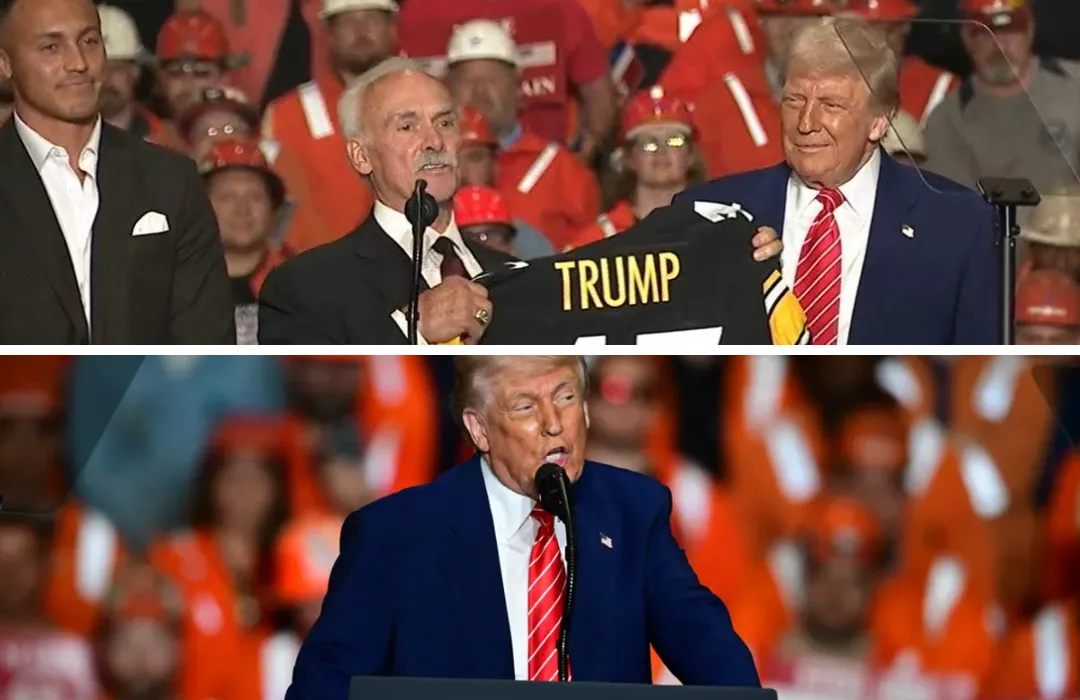White House Press Secretary Karoline Leavitt found herself on the receiving end of a live fact-check during a press briefing on Wednesday after making a false claim about the background of federal Judge James Boasberg. Leavitt had claimed that Judge Boasberg, who temporarily halted President Donald Trump's deportation order under the Alien Enemies Act, was appointed by former President Barack Obama.
However, the White House correspondent who asked the question quickly corrected her, revealing that Boasberg was, in fact, appointed by former President George W. Bush.
The controversy began during a press briefing when Leavitt was asked about Trump’s attempt to impeach Judge Boasberg, who temporarily paused the deportation of migrants under Trump’s controversial immigration order. The president invoked the Alien Enemies Act of 1798, which allows the government to deport individuals from countries deemed enemies of the United States.
The deportation campaign was aimed at migrants whom the administration claims are foreign terrorists.
Leavitt’s response, however, took an inaccurate turn when she discussed Judge Boasberg’s background. “We don’t have any flights planned specifically, but we will continue with the mass deportations,” she began.
“And I would just like to point out that the judge in this case is essentially trying to say that the president doesn’t have the executive authority to deport foreign terrorists from our American soil.”
She then went on to criticize Boasberg, labeling him as a “Democrat activist” and falsely claiming that he was appointed by Obama. “Under the Alien Enemies Act, the president has this power, and that’s why this deportation campaign has continued,” she added.
“And this judge, Judge Boasberg, is a Democrat activist. He was appointed by Barack Obama. His wife has donated more than $10,000 to Democrats, and he has consistently shown his disdain for this president and his policies, and it’s unacceptable.”
However, NBC News Senior White House Correspondent Garrett Haake, who had asked the initial question, quickly fact-checked Leavitt’s statement, pointing out that Boasberg was, in fact, appointed by George W. Bush.

Haake, who had been listening attentively to Leavitt’s response, intervened by saying, “You took me right where I wanted to go about the idea of these people are all foreign terrorists, but Judge Boasberg was originally appointed by George W. Bush and then elevated by Barack Obama. I just feel like I should clear that up…”
Leavitt, instead of acknowledging the mistake, quickly pivoted the conversation back to her initial talking points. “Well, let me just say something to that effect, Garrett. Sixty-seven percent of all of the injunctions in this century have come against which president? Donald J. Trump,” she said.
“This is a clear, concerted effort by leftists who don’t like this president and are trying to impose or slow down his agenda.”
Leavitt’s response highlighted her tendency to defend the administration and shift the narrative, even when factually incorrect. Despite the fact-checking from Haake, Leavitt did not retract her statement but instead shifted the focus onto what she described as an effort by the political left to impede Trump’s agenda.
The incident marked another in a series of factual missteps by Leavitt, who has been fact-checked multiple times during her short tenure as press secretary.
Just the week before, Leavitt made a claim regarding tariffs that was also fact-checked and deemed false by PolitiFact. She had stated that tariffs were “a tax cut for the American people.”
PolitiFact rated her statement as false, pointing out that economists had described tariffs as “tax hikes” rather than tax cuts. This was not the first time Leavitt had been caught in an inaccuracy. In fact, she had been fact-checked more in her first two months as press secretary than her predecessor, Jen Psaki, was in 16 months.
Leavitt's series of fact-checks has raised eyebrows among reporters and critics alike. Fact-checking has become an essential part of modern journalism, especially given the prevalence of misinformation in political discourse.

Press secretaries, who are often the spokespersons for the administration, are expected to present accurate information, but Leavitt’s record has been marred by inaccuracies.
The fact-check on her statement about Judge Boasberg was particularly noteworthy because it underscored the importance of accuracy when discussing judicial appointments and their potential influence on policy. Judicial independence is a cornerstone of the American legal system, and it is crucial that public officials, especially those in positions of power like the White House Press Secretary, provide accurate information when discussing the courts and the judges who serve in them.
Judge Boasberg, appointed to the U.S. District Court for the District of Columbia by George W. Bush in 2003, has garnered a reputation for being a fair and impartial judge. His decision to temporarily block Trump’s deportation order came after the administration sought to expedite the removal of migrants from certain countries deemed to be a security threat.
While Leavitt’s initial statement was aimed at discrediting Boasberg’s ruling, it was crucial to clarify his judicial background, as it could influence how the public perceives his legal decisions.
This incident also highlights the broader political context in which these legal battles are taking place. President Trump has faced significant legal challenges throughout his tenure, especially in regard to immigration policy.
The president’s frequent clashes with the judiciary, especially when rulings go against his policies, have led to accusations that he undermines the independence of the courts. Leavitt’s comments, particularly her attempt to delegitimize Judge Boasberg’s ruling based on his alleged political affiliation, further contributed to this narrative.
Moreover, the situation underscores the polarized nature of American politics. With ongoing battles over immigration, judicial appointments, and executive powers, the rhetoric surrounding these issues has become increasingly heated.
Leavitt’s comments, coupled with the growing number of fact-checks against her statements, illustrate the tension between the Trump administration’s messaging and the factual accuracy of those messages.

In the end, the incident serves as a reminder of the importance of accountability, especially for those in public office who hold significant influence over the information presented to the public. As press secretary, Leavitt’s role is to inform the American people, but when her statements are proven to be inaccurate, it raises questions about the reliability of the information being disseminated.
In a time when truth and facts have become increasingly politicized, ensuring that public officials are held accountable for their words is more important than ever.

-1745655188-q80.webp)


